基础英语2第二单元答案The
- 格式:docx
- 大小:46.94 KB
- 文档页数:11
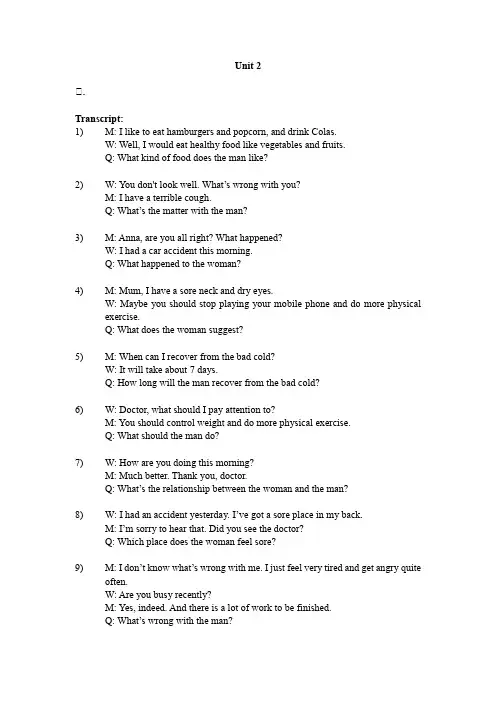
Unit 2Ⅰ.Transcript:1)M: I like to eat hamburgers and popcorn, and drink Colas.W: Well, I would eat healthy food like vegetables and fruits.Q: What kind of food does the man like?2)W: You don't look well. What’s wrong with you?M: I have a terrible cough.Q: What’s the matter with the man?3)M: Anna, are you all right? What happened?W: I had a car accident this morning.Q: What happened to the woman?4) M: Mum, I have a sore neck and dry eyes.W: Maybe you should stop playing your mobile phone and do more physical exercise.Q: What does the woman suggest?5)M: When can I recover from the bad cold?W: It will take about 7 days.Q: How long will the man recover from the bad cold?6) W: Doctor, what should I pay attention to?M: You should control weight and do more physical exercise.Q: What should the man do?7)W: How are you doing this morning?M: Much better. Thank you, doctor.Q: What’s the relationship between the woman and the man?8) W: I had an accident yesterday. I’ve got a sore place in my back.M: I’m sorry to hear that. Did you see the doctor?Q: Which place does the woman feel sore?9)M: I don’t know what’s wrong with me. I just feel very tired and get angry quiteoften.W: Are you busy recently?M: Yes, indeed. And there is a lot of work to be finished.Q: What’s wrong with the man?10) W: I have a toothache.M: I see. How long have you been like this?W: Since last Friday.Q: How long does the woman have a toothache?1) — 5) CBCCC6) — 10) ACAABⅠ.Transcript:People are less active nowadays, partly because technology has made our lives easier. Fewer people are doing manual work, and most of us have jobs that involve little physical effort. Evidence shows that whatever your age, being physically active can help you lead a healthier and happier life. People who exercise often do have fewer chances to develop many long-term illnesses. What is more, physical activity can also boost self-respect, mood, sleep quality and energy.11) technology12) manual13) effort14) develop15) self-respectⅠ.16)-20): DGEAB21)-25): DFABGIV.26)-30): ABCAD31)-35): ACAAB36)-40): DABDC41)-45): BABDAV.46)-50): CDABC51)-55): CBDDAⅠI.56)-60): CADDC61)-65): ACACCⅠI.66) move around67) decrease68) What’s wrong69) What should70) under great pressure。
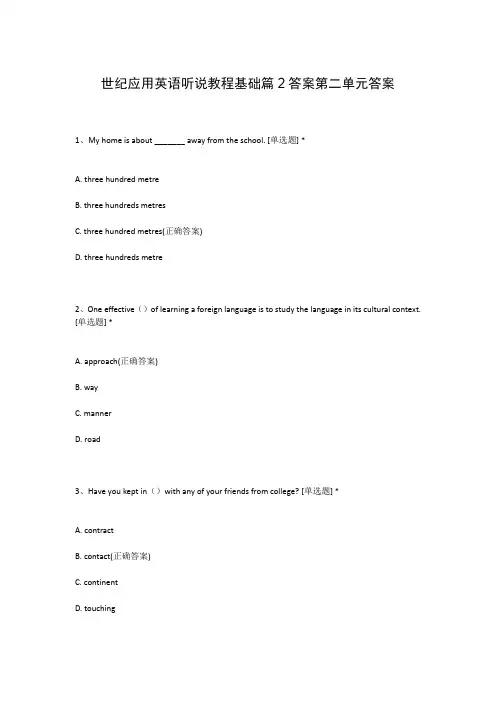
世纪应用英语听说教程基础篇2答案第二单元答案1、My home is about _______ away from the school. [单选题] *A. three hundred metreB. three hundreds metresC. three hundred metres(正确答案)D. three hundreds metre2、One effective()of learning a foreign language is to study the language in its cultural context. [单选题] *A. approach(正确答案)B. wayC. mannerD. road3、Have you kept in()with any of your friends from college? [单选题] *A. contractB. contact(正确答案)C. continentD. touching4、24.I often ask my English teacher some questions ________ e-mail. [单选题] * A.by(正确答案)B.inC.forD.with5、The sun disappeared behind the clouds. [单选题] *A. 出现B. 悬挂C. 盛开D. 消失(正确答案)6、Sitting at the back of the room()a very shy girl with two bright eyes. [单选题] *A. is(正确答案)B. areC. hasD. there was7、There are sixty _______ in an hour. [单选题] *A. hoursB. daysC. minutes(正确答案)D. seconds8、If you do the same thing for a long time, you'll be tired of it. [单选题] *A. 试图B. 努力C. 厌倦(正确答案)D. 熟练9、A lot of students in our school were born _______ March, 1 [单选题] *A. in(正确答案)B. atC. onD. since10、- I haven't been to Guilin yet.- I haven t been there, ______. [单选题] *A. tooB. alsoC. either(正确答案)D. neither11、39.__________ he was very tired, he didn’t stop working. [单选题] *A.Although (正确答案)B.WhenC.AfterD.Because12、Generally speaking, it is _______ to ask a woman’s age in western countries. [单选题] *A. possibleB. importantC. not polite(正确答案)D. polite13、-Do you have tickets for Friday? -Sorry, we've got _____ left. [单选题] *A. eitherB. none(正确答案)C. no oneD. neither14、10.Mum, let me help you with your housework, so you ________ do it yourself. [单选题] *A.don’t need to(正确答案)B.need toC.don’t needD.need15、John suggest _____ anything about it until they found out more facts. [单选题] *A not to sayB. not sayC to say notD not saying(正确答案)16、I _______ no idea of where the zoo is. [单选题] *A. thinkB. getC. have(正确答案)D. take17、I like dancing, ______ I can join the Dancing Club.()[单选题] *A. becauseB. so(正确答案)C. andD. but18、We must try hard to make up for the lost time. [单选题] *A. 弥补(正确答案)B. 利用C. 抓紧D. 浪费19、I hope to see you again _______. [单选题] *A. long long agoB. long beforeC. before long(正确答案)D. long20、Her ideas sound right, but _____ I'm not completely sure. [单选题] *A. somehow(正确答案)B. somewhatC. somewhereD. sometime21、_______ travelers come to visit our city every year. [单选题] *A. Hundred ofB. Hundreds of(正确答案)C. Five HundredsD. Five hundred?of22、Sometimes only()10 out of 500 or more candidates succeed in passing all the tests. [单选题] *A. as many asB. as few as(正确答案)C. as much asD. as little as23、I walked too much yesterday and ()are still aching now. [单选题] *A. my leg's musclesB. my leg muscles(正确答案)C. my muscles' of legD. my legs' muscles24、Every year Carl _______ most of his time swimming, camping and traveling with his parents. [单选题] *A. is spendingB. spentC. will spendD. spends(正确答案)25、1.I saw ________ action film with my friend yesterday, and ________ film was amazing. [单选题] *A.a...aB.a...theC.an...the(正确答案)D.an...a26、It was difficult to guess what her_____to the news would be. [单选题] *A.impressionmentC.reaction(正确答案)D.opinion27、9.There will be a lot of activities at English Festival nest month. Which one would you like to ________? [单选题] *A.take part in (正确答案)B.joinC.attendD.go28、—Why do you call him Mr. Know?—______ he knows almost everything that we want to know.()[单选题] *A. SoB. OrC. ButD. Because(正确答案)29、The weather forecast says that we’ll have occasional rain tomorrow. [单选题] *A. 偶尔的B. 不停的C. 少量的(正确答案)D. 不可预测的30、26.There’s some fruit in the kitchen. We ________ buy any. [单选题] *A.need toB.needn’t toC.don’t needD.don’t need to(正确答案)。
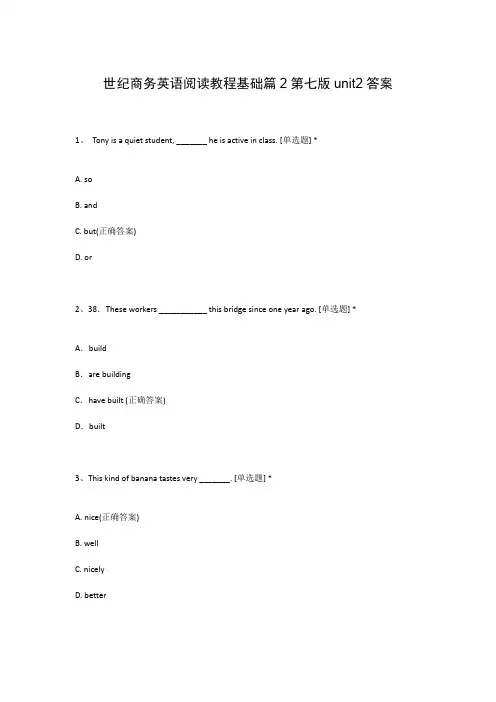
世纪商务英语阅读教程基础篇2第七版unit2答案1、Tony is a quiet student, _______ he is active in class. [单选题] *A. soB. andC. but(正确答案)D. or2、38.These workers ___________ this bridge since one year ago. [单选题] * A.buildB.are buildingC.have built (正确答案)D.built3、This kind of banana tastes very _______. [单选题] *A. nice(正确答案)B. wellC. nicelyD. better4、74.In England people drive________. [单选题] *A.on the left(正确答案)B.in the leftC.on leftD.in left5、I took?some _______of the Great Wall?in China last year. [单选题] *A. potatoesB. tomatoesC. photos(正确答案)D. paintings6、I think _______ is nothing wrong with my car. [单选题] *A. thatB. hereC. there(正确答案)D. where7、( ) No matter _____ hard it may be, I will carry it out. [单选题] *A whatB whateverC how(正确答案)D however8、He doesn’t feel well. He has a _______ nose. [单选题] *A. runingB. rainingC. runny(正确答案)D. rainy9、These apples smell _____ and taste ______. [单选题] *A. well; wellB. good; good(正确答案)C. well; goodD. good; well10、_____ whether robots will one day have vision as good as human vision. [单选题] *A. What is not yet knownB. It is not yet known(正确答案)C. As is not yet knownD. This is not yet known11、I have only two tickets for TF Boys’concert. ______ you ______ he can go with me.()[单选题] *A. Either; or(正确答案)B. Either; norC. Both; andD. Not only; but also12、Do you know what()the change in his attitude? [单选题] *A. got throughB. brought about(正确答案)C. turned intoD. resulted from13、You should take the medicine after you read the _______. [单选题] *A. linesB. wordsC. instructions(正确答案)D. suggestions14、10.Mum, let me help you with your housework, so you ________ do it yourself. [单选题] *A.don’t need to(正确答案)B.need toC.don’t needD.need15、She often _______ at 21: [单选题] *A. go to bedB. gets upC. goes to bed(正确答案)D. gets to16、—______ pencils are these?—They are Tony’s.()[单选题] *A. WhatB. WhereC WhoD. Whose(正确答案)17、It was _____ that the policy of reform and opening up came into being in China. [单选题] *A. in the 1970s(正确答案)B. in 1970sC. in the 1970s'D. in 1970's18、18.Who is staying at home now? ________, all of them are out. [单选题] * A.NoneB.No one(正确答案)C.EveryoneD.Nothing19、It usually takes him about 15 minutes _______ his bike to school. [单选题] *A. ridesB. ridingC. rideD. to ride(正确答案)20、I _______ seeing you soon. [单选题] *A. look afterB. look forC. look atD. look forward to(正确答案)21、—_____ are the Olympic Games held? —Every four years [单选题] *A. How longB. How often(正确答案)C. How soonD. How far22、You should _______ fighting with your parents although you may have different ideas from time to time. [单选题] *A. suggestB. enjoyC. avoid(正确答案)D. practice23、27.Will it ______ warm in the room? [单选题] *A.areB.be(正确答案)C.isD.going to be24、Words are windows()you can look into the past. [单选题] *A. through which(正确答案)B. through thatC. whichD. whose25、—Are these your sheep? [单选题] *A)on grass at the foot of the hill.(正确答案)B. feedC.is fedD. is feeding26、21 In a few years' time, there ________ thousands of trees on the hill. [单选题] * A.will haveB.will be(正确答案)C.are haveD.have27、The green shorts are _______ sale for $[单选题] *A. forB. on(正确答案)C. atD. with28、58.—How much is Lucy's skirt?—She________320 yuan for it. I think it's a little dear. [单选题] *A.tookB.paid(正确答案)C.spentD.bought29、I like the food very much.It is _______. [单选题] *A. terribleB. expensiveC. delicious(正确答案)D. friendly30、Every means _____ but it's not so effective. [单选题] *A. have been triedB. has been tried(正确答案)C. have triedD. has tried。
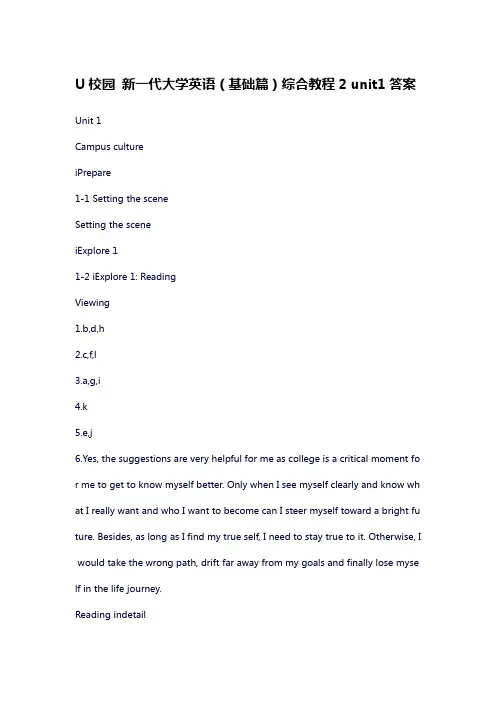
U校园新一代大学英语(基础篇)综合教程2 unit1答案Unit 1Campus cultureiPrepare1-1 Setting the sceneSetting the sceneiExplore 11-2 iExplore 1: ReadingViewing1.b,d,h2.c,f,l3.a,g,i4.k5.e,j6.Yes, the suggestions are very helpful for me as college is a critical moment fo r me to get to know myself better. Only when I see myself clearly and know wh at I really want and who I want to become can I steer myself toward a bright fu ture. Besides, as long as I find my true self, I need to stay true to it. Otherwise, I would take the wrong path, drift far away from my goals and finally lose myse lf in the life journey.Reading indetailVocabularyUnderstanding1-3 iExplore 1: Building your language Words and expressions1.lean2.heavily3.terrified4.bumped5.lengthy6.flaws1.A2.B3.B4.A5.A6.B7.A8.BCollocations1.1)B1.2)A2.1)A2.2)B3.1)A3.2)B4.1)B4.2)A1.take notes2.vitally important3.takes time4.do the laundrypletely random6.Lean heavily on/heavily lean onVocabulary learning strategies1.inevitable2.unacceptable3.immature4.irresponsible5.irregular6.inconsiderate7.illiterate8.independent9.unconscious10.illegal11.impractical12.undecided1.irresponsible2.illiterate3.immature4.lrregular5. unacceptable6. inconsiderate Language focus1.to be chosen2.to share3.to be contacted4.to be taken5.to know1.to be printed out2.to do whatever you want3.to discoverwho you are4.to be warned ofBanked cloze1.living2.belong3.poke4.seeking5.chose6.randomfortable8.found9.worse10.amazingiExplore 21-4 iExplore: ReadingViewing1.Mental health problems.2.Anxiety, depression, and relationship problems.3.She went to the therapist, and asked for help.4.They should talk to somebody.5.She has learned that there's nothing in life she, or anyone for that matter, ca n't overcome.Yes, I felt a little depressed after entering university last September as I hadn't adapted to the life in the new city yet. I complained to my roommates several t imes. Luckily, they were really helpful and warm-hearted, always comforting and encouraging me. We often spent time togethe r and had great fun, chatting and laughing in the dorm, doing assignments in t he library, and sharing food in the canteen. Gradually, I returned to what I was like before. Now, all my roommates have become my intimate friends.No, all t he new friends around me seem to be really positive. Although we have a lot o f pressure from life and study, we often encourage each other to overcome diff iculties on our way to growth. More importantly, our teachers are always ready to help. Whenever we meet difficulties, we can ask them for help.Reading in detailVocabularyUnderstanding1-5 iExplore 2: Building yourlanguageWords and expressions1.Obstacles2.Sympathy3.Overcome4.Confident5.Anxiety6.Blamed7.Reacted8.Hesitated1.stay true to2.regardless of3.in another person's shoes / in someone else's shoes4.take on5.in the wake of6.other thanCollocations1.ask for help /seek help2.mental health3.good health4.close relationship5.meaningful relationship / lasting relationship6.provides an opportunity / provides the opportunity / creates an opportunity / creates the opportunity1.dangerously2.incredibly3.ultimately4.actuallypletely6.understandablyVocabulary learning strategies1.Confident2.Question3.Lost confidence4.Uncertainty5.Excited6.Vulnerable7.gratefulTranslation1.许多新生面临的一个主要问题是既想家,又缺乏归属感。
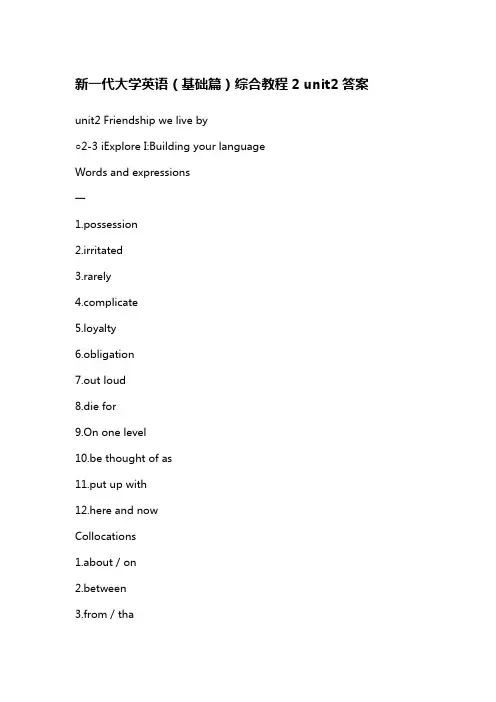
新一代大学英语(基础篇)综合教程2 unit2答案unit2 Friendship we live by○2-3 iExplore I:Building your languageWords and expressions一1.possession2.irritated3.rarelyplicate5.loyalty6.obligation7.out loud8.die for9.On one level10.be thought of as11.put up with12.here and nowCollocations1.about / on2.between3.from / tha4.with5.in6.of7.to8.have the obligation to help our friends / have an obligation to help our friends9.Pleasurable relationships between classmates10.enjoyed his company11.have formed a friendship with each other12.meet the obligation to care for his parents13.could lose our friendship because of moneyVocabulary learning strategies1.cultivation2.division3.management4.impression5.association6.involvement7.confusion8.intentionmunication10. argument11.requirement12.expression13.division14.intention15.management16.involvement17.expression18.cultivationLanguage focus1. As the old saying goes, a friend in need is a friend indeed.2. Remember you must follow every step as I've shown you.3. As most people know, their school is one of the top schools in China.4. As he said, he chatted with his old friends to his heart's content at the party.5. You should treat your friends as you would like to be treated. Banked cloze1.obligations2.rarelypany4.control5.challenge6.drops7.meaning8.evidence9.without10.defines○iExplore22-4iExplore:ReadingListening1.relax2.think over3.attract4.one person / 1 person5.who you are / who you're6.be confident7.be yourself8.When I meet new people, I will try to make friends with them gradually. During the process, I may pay attention to their living habits, personalities and interests. If I find that we share some same values, I will have more contact with them and we will probably become friends. However, if there is little in common between us, I will keep them at a distance and take them as acquaintances.2-5iExplore2:Building your languageWords and expressions1.convince2.approval3.potential4.acceptance5.destructive6.conflict7.through8.to9.into10.for11.to12.by/to13.byCollocations1.shift1(A) I work in the night.1(B) The wind changes its direction.1(C) I expect him to agree with me.1(D) No, the discussion is not efficient.2 drift2(A) No, we don't keep frequent contact.2(B) The lecture is boring to me.2(C) The sun will come out and it will be sunny.3 fade3(A) It is an old photo.3(B) Yes, it is true. Many researches support this. Besides, senior people around me always complain about their bad memory.3(C) When the last scene finishes.3(D) I would talk with my friends or take part in some activities that interest me.Vocabulary learning stategies1.B2.G3.F4.E5.D6.H7.A8.I9.C 10.J11.give you a glimpse into your future12.elevate you / elevate each other13.friends that I may be holding back / hold you back / hold each other back14.meet with a lot of resistanceTranslation1. 当社会环境改变时,要满足以下三个交友条件便更困难了:相似性、交流和让人彼此信任的情境。
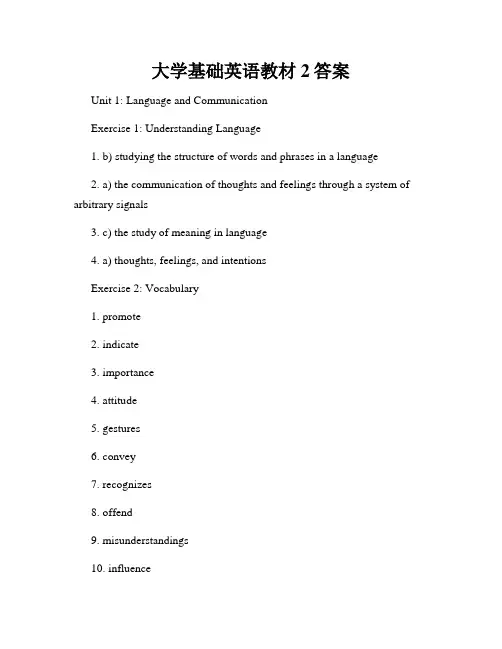
大学基础英语教材2答案Unit 1: Language and CommunicationExercise 1: Understanding Language1. b) studying the structure of words and phrases in a language2. a) the communication of thoughts and feelings through a system of arbitrary signals3. c) the study of meaning in language4. a) thoughts, feelings, and intentionsExercise 2: Vocabulary1. promote2. indicate3. importance4. attitude5. gestures6. convey7. recognizes8. offend9. misunderstandings10. influenceUnit 2: Academic LifeExercise 1: Understanding Academic Vocabulary1. b) Textbooks2. c) A written or printed work that provides factual information or expert knowledge in a particular area3. b) To accept something, especially a task or responsibility, when it is difficult or unpleasant4. a) A detailed plan for the organization or achievement of a particular goal5. c) A formal written request, typically one signed by many people, appealing to authority with respect to a particular cause6. a) Serious, solemn, or grave in manner or appearance7. b) The quality of behaving or speaking in a way that is appropriate for polite or formal situationsExercise 2: Reading Comprehension1. The main purpose of a textbook is to assist students in understanding specific subjects and to provide them with the necessary information and knowledge related to those subjects. Textbooks often present information in a structured and organized manner, making it easier for students to comprehend and learn.2. Textbooks typically contain chapters with clear headings and subheadings, making it simple to locate and access relevant informationquickly. They also often feature diagrams, illustrations, and charts to aid visual learners in understanding complex concepts.3. Many textbooks include exercises and assignments to help students apply and reinforce what they have learned. These activities may include multiple-choice questions, fill-in-the-blank exercises, and essay prompts.4. Additionally, textbooks often provide summaries and review sections at the end of each chapter or unit, allowing students to recap and consolidate their understanding of the material. These summaries can be particularly helpful when preparing for exams or writing research papers.Unit 3: RelationshipsExercise 1: Vocabulary in Context1. honesty2. compromise3. loyalty4. patience5. forgiveness6. understanding7. communication8. respect9. support10. trustExercise 2: Reading Comprehension1. The key to a successful relationship is effective communication. Both partners must be open and honest with each other, expressing their thoughts and feelings clearly. Good communication helps build trust, as it demonstrates a willingness to be vulnerable and share one's true self.2. Trust is another vital component of a healthy relationship. Without trust, there can be no genuine intimacy. Trust is built over time through consistent actions and words that align with one's promises and commitments.3. Loyalty is also crucial. Being loyal means standing by your partner's side and supporting them through thick and thin. It involves being faithful, both emotionally and physically, and being there for your partner when they need you most.4. Patience is a virtue in any relationship. It is essential to understand that both partners are individuals with their own strengths, weaknesses, and quirks. Patience allows for acceptance and growth, as well as the ability to navigate conflicts and challenges with grace.Unit 4: Travel and LeisureExercise 1: Vocabulary in Context1. exploration2. immerse3. encounters4. fascinating5. diverse6. scenic7. adventure8. hospitality9. exhilarating10. culturalExercise 2: Reading Comprehension1. Traveling allows individuals to broaden their horizons through exploration. It exposes people to new cultures, traditions, and perspectives, ultimately expanding their understanding of the world.2. When immersing oneself in a new environment, individuals have the opportunity to learn and grow. They can step out of their comfort zones and engage in cultural exchanges, which can lead to personal transformation and self-discovery.3. Traveling often involves unexpected encounters with people from diverse backgrounds. These encounters can be enlightening and provide a deeper appreciation for the richness and variety of human experiences.4. Exploring scenic destinations can be both visually and emotionally captivating. It allows individuals to connect with the beauty of nature and provides a sense of tranquility and serenity.5. Traveling is an adventure in itself. It brings excitement and a sense of freedom as individuals step outside of their daily routines and embark onnew experiences. It provides an opportunity to step out of one's comfort zone and embrace the unknown.In conclusion, the content and structure of the answers above are presented in a clear and organized manner, ensuring easy comprehension and a positive reading experience for learners.。
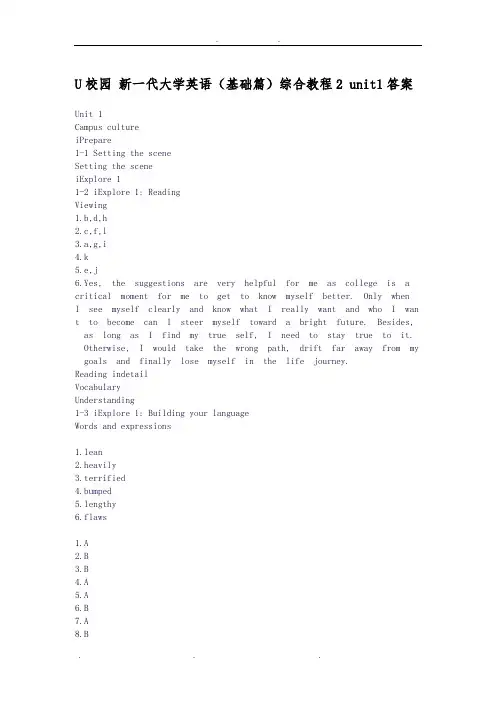
U校园新一代大学英语(基础篇)综合教程2 unit1答案Unit 1Campus cultureiPrepare1-1 Setting the sceneSetting the sceneiExplore 11-2 iExplore 1: ReadingViewing1.b,d,h2.c,f,l3.a,g,i4.k5.e,j6.Yes, the suggestions are very helpful for me as college is a critical moment for me to get to know myself better. Only when I see myself clearly and know what I really want and who I wan t to become can I steer myself toward a bright future. Besides, as long as I find my true self, I need to stay true to it. Otherwise, I would take the wrong path, drift far away from my goals and finally lose myself in the life journey.Reading indetailVocabularyUnderstanding1-3 iExplore 1: Building your languageWords and expressions1.lean2.heavily3.terrified4.bumped5.lengthy6.flaws1.A2.B3.B4.A5.A6.B7.A8.BCollocations1.1)B1.2)A2.1)A2.2)B3.1)A3.2)B4.1)B4.2)A1.take notes2.vitally important3.takes time4.do the laundrypletely random6.Lean heavily on/heavily lean onVocabulary learning strategies1.inevitable2.unacceptable3.immature4.irresponsible5.irregular6.inconsiderate7.illiterate8.independent9.unconscious10.illegal11.impractical12.undecided1.irresponsible2.illiterate3.immature4.lrregular5. unacceptable6. inconsiderateLanguage focus1.to be chosen2.to share3.to be contacted4.to be taken5.to know1.to be printed out2.to do whatever you want3.to discoverwho you are4.to be warned ofBanked cloze1.living2.belong3.poke4.seeking5.chose6.randomfortable8.found9.worse10.amazingiExplore 21-4 iExplore: ReadingViewing1.Mental health problems.2.Anxiety, depression, and relationship problems.3.She went to the therapist, and asked for help.4.They should talk to somebody.5.She has learned that there's nothing in life she, or anyone fo r that matter, can't overcome.Yes, I felt a little depressed after entering university last Sep tember as I hadn't adapted to the life in the new city yet. I complained to my roommates several times. Luckily, they were rea lly helpful and warm-hearted, always comforting and encouraging me. We often spent time together and had great fun, chatting and l aughing in the dorm, doing assignments in the library, and sharin g food in the canteen. Gradually, I returned to what I was like before. Now, all my roommates have become my intimate friends.No , all the new friends around me seem to be really positive. Alt hough we have a lot of pressure from life and study, we often encourage each other to overcome difficulties on our way to growt h. More importantly, our teachers are always ready to help. Whene ver we meet difficulties, we can ask them for help.Reading in detailVocabularyUnderstanding1-5 iExplore 2: Building yourlanguageWords and expressions1.Obstacles2.Sympathy3.Overcome4.Confident5.Anxiety6.Blamed7.Reacted8.Hesitated1.stay true to2.regardless of3.in another person's shoes / in someone else's shoes4.take on5.in the wake of6.other thanCollocations1.ask for help /seek help2.mental health3.good health4.close relationship5.meaningful relationship / lasting relationship6.provides an opportunity / provides the opportunity / creates an opportunity / creates the opportunity1.dangerously2.incredibly3.ultimately4.actuallypletely6.understandablyVocabulary learning strategies1.Confident2.Question3.Lost confidence4.Uncertainty5.Excited6.Vulnerable7.gratefulTranslation1.许多新生面临的一个主要问题是既想家,又缺乏归属感。
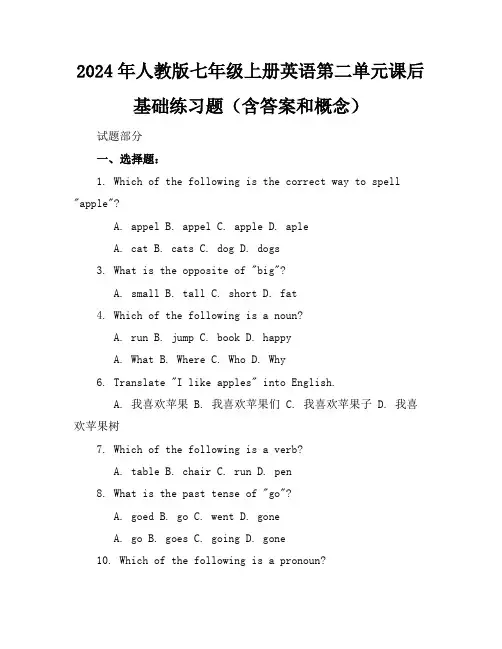
2024年人教版七年级上册英语第二单元课后基础练习题(含答案和概念)试题部分一、选择题:1. Which of the following is the correct way to spell "apple"?A. appelB. appelC. appleD. apleA. catB. catsC. dogD. dogs3. What is the opposite of "big"?A. smallB. tallC. shortD. fat4. Which of the following is a noun?A. runB. jumpC. bookD. happyA. WhatB. WhereC. WhoD. Why6. Translate "I like apples" into English.A. 我喜欢苹果B. 我喜欢苹果们C. 我喜欢苹果子D. 我喜欢苹果树7. Which of the following is a verb?A. tableB. chairC. runD. pen8. What is the past tense of "go"?A. goedB. goC. wentD. goneA. goB. goesC. goingD. gone10. Which of the following is a pronoun?A. heB. appleC. runD. book二、判断题:1. "Dog" and "cat" are both nouns. ( )2. "Run" and "jump" are both adjectives. ( )3. "What" is a question word. ( )4. "I like apple" is a correct sentence. ( )5. "She go to school" is a correct sentence. ( )6. "He" is a verb. ( )7. "Big" and "small" are synonyms. ( )8. "I am go to the park" is a correct sentence. ( )9. "Apple" is the plural form of "apples". ( )10. "The cat is sleeping" is a past tense sentence. ( )三、填空题:1. The abbreviation for "United Kingdom" is ________.2. "I am" is the first person singular of "_______" in present simple tense.3. The past tense of "do" is ________.4. A sentence must have at least one ________ and one ________.5. The opposite of "expensive" is ________.6. "She ________ her homework every evening." (Use the correct form of "do")7. "They ________ to the cinema last week." (Use the correct past tense verb)8. "_______" is the correct way to say "Thank you" in Spanish.9. "I can ________ English." (Fill in the correct verb)11. The plural form of "child" is ________.12. "_______" is the correct form of "I" if the speakeris a girl.13. "I have ________ money." (Choose the correct form of "some")14. "He is ________ to go to the park." (Fill in the correct form of "like")15. "_______" is the correct form of "they" if referring to a single person.16. "The sun ________ in the east." (Use the correct form of "rise")17. "I am ________ years old." (Fill in the correct possessive adjective)18. "_______" is the correct form of "we" if the speaker is included.19. "She ________ her breakfast at 7 o'clock." (Use the correct form of "have")20. "_______" is the correct form of "you" if you are speaking to one person.四、简答题:1. What is the difference between "a" and "an"?2. Explain the difference between "present simple" and "present continuous" tense.3. Write a sentence using the future tense with "will."4. What is a conjunction and give an example.5. How do you form the past tense of regular verbs?6. What is a preposition and give three examples.8. What is the plural form of "mouse"?9. Explain what an adverb is and give an example.10. Translate "Good morning" into French.一、选择题答案:1. C2. A3. A4. C5. A6. A7. C8. C9. B10. A二、判断题答案:1. √2. ×3. √5. ×6. ×7. √8. ×9. ×10. ×三、填空题答案:1. UK2. be3. did4. subject, verb5. cheap6. does7. went8. Gracias9. speak10. taller11. children12. She13. some14. likes15. It16. rises18. We19. has20. You四、简答题答案:1. "A" is used before words that begin with a consonant sound, while "an" is used before words that begin with a vowel sound.2. "Present simple" is used for habits or general truths, while "present continuous" is used for actions happening now.3. I will go to the store tomorrow.4. A conjunction connects words, phrases, or clauses. Example: "and"5. Regular verbs form the past tense adding ed to the base form of the verb.6. A preposition shows the relationship between a noun or pronoun and other words in the sentence. Examples: in, on, under7. She is happier now than she was before.8. Mice9. An adverb modifies a verb, adjective, or another adverb. Example: "quickly"10. BonjourGrammar: The practice questions cover various aspects of grammar, including verb tenses, nouns, pronouns, adjectives, adverbs, prepositions, conjunctions, and question words.Spelling: Students are tested on their ability to correctly spell words.Sentence Structure: Questions focus on constructing correct sentences, including subjectverb agreement and question formation.Translation: Basic translation skills are tested with simple phrases.各题型知识点详解和示例:选择题:Test students' knowledge of grammar rules, vocabulary, and sentence structure. For example, Question 1 tests the correct spelling of a word.判断题:Assess students' understanding of grammatical concepts. For example, Question 1 checks if students knowthat "dog" and "cat" are both nouns.简答题:Measure students' ability to explain grammatical concepts and demonstrate their vocabulary knowledge. For example, Question 1 requires students to explain the difference between "a" and "an."。
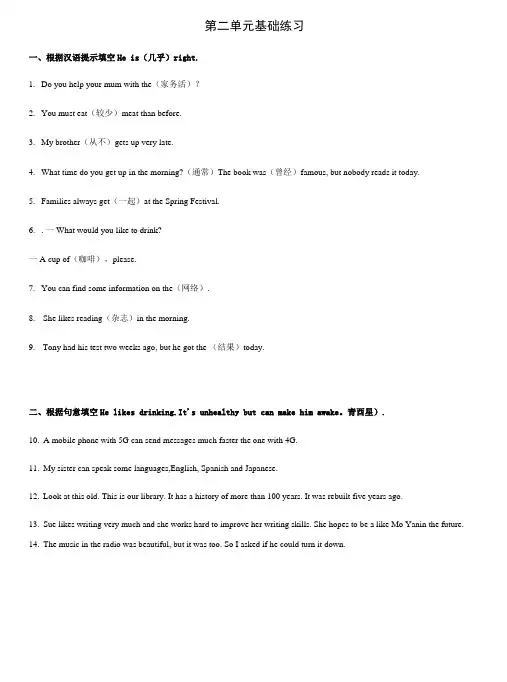
第二单元基础练习一、根据汉语提示填空He is(几乎)right.1.Do you help your mum with the(家务活)?2.You must eat(较少)meat than before.3.My brother(从不)gets up very late.4.What time do you get up in the morning?(通常)The book was(曾经)famous, but nobody reads it today.5.Families always get(一起)at the Spring Festival.6.. 一What would you like to drink?一A cup of(咖啡),please.7.You can find some information on the(网络).8.She likes reading(杂志)in the morning.9.Tony had his test two weeks ago, but he got the (结果)today.二、根据句意填空He likes drinking.It's unhealthy but can make him awake。
青酉星).10.A mobile phone with 5G can send messages much faster the one with 4G.11.My sister can speak some languages,English, Spanish and Japanese.12.Look at this old. This is our library. It has a history of more than 100 years. It was rebuilt five years ago.13.Sue likes writing very much and she works hard to improve her writing skills. She hopes to be a like Mo Yanin the future.14.The music in the radio was beautiful, but it was too. So I asked if he could turn it down.25. (F)estival (t)ogether【解析】句意:——你为什么喜欢中秋节?——因为我喜欢吃月饼和聚在一起。
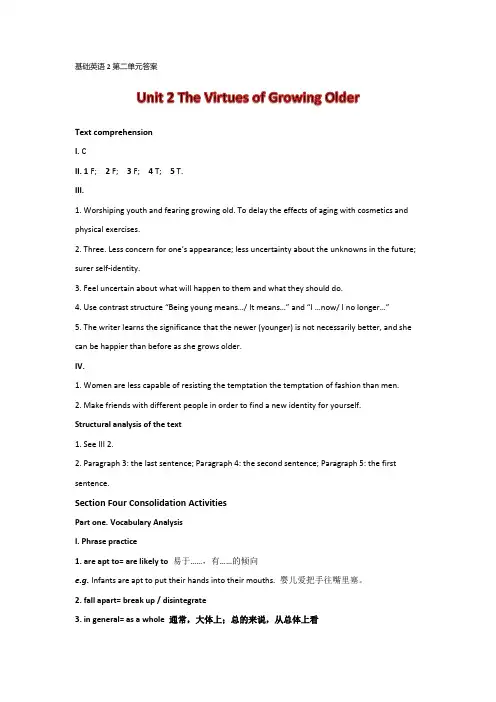
基础英语2第二单元答案Text comprehensionI. CII. 1 F; 2 F; 3 F; 4 T; 5 T.III.1. Worshiping youth and fearing growing old. To delay the effects of aging with cosmetics and physical exercises.2. Three. Less concern for one’s appearance; less uncertainty about the unknowns in the future; surer self-identity.3. Feel uncertain about what will happen to them and what they should do.4. Use contrast structure “Being young means…/ It means…” and “I …now/ I no longer…”5. The writer learns the significance that the newer (younger) is not necessarily better, and she can be happier than before as she grows older.IV.1. Women are less capable of resisting the temptation the temptation of fashion than men.2. Make friends with different people in order to find a new identity for yourself.Structural analysis of the text1. See III2.2. Paragraph 3: the last sentence; Paragraph 4: the second sentence; Paragraph 5: the first sentence.Section Four Consolidation ActivitiesPart one. Vocabulary AnalysisI. Phrase practice1. are apt to= are likely to 易于……,有……的倾向e.g. Infants are apt to put their hands into their mouths. 婴儿爱把手往嘴里塞。
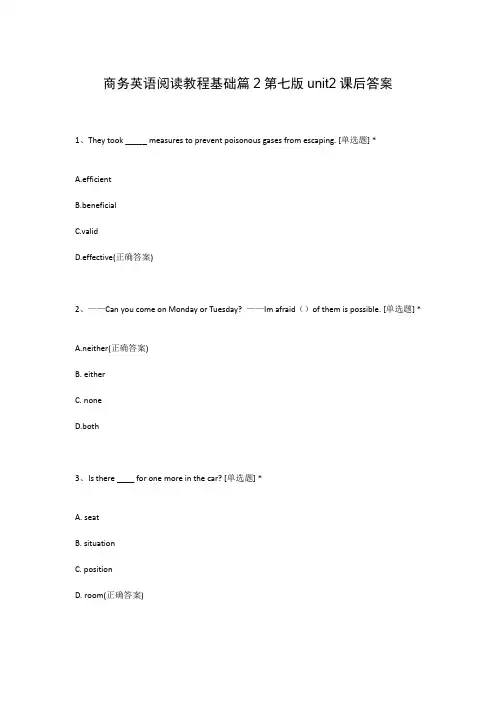
商务英语阅读教程基础篇2第七版unit2课后答案1、They took _____ measures to prevent poisonous gases from escaping. [单选题] *A.efficientB.beneficialC.validD.effective(正确答案)2、——Can you come on Monday or Tuesday? ——Im afraid()of them is possible. [单选题] *A.neither(正确答案)B. eitherC. noneD.both3、Is there ____ for one more in the car? [单选题] *A. seatB. situationC. positionD. room(正确答案)4、If the manager had to choose between the two, he would say John was _____ choice. [单选题] *A. goodB. the bestC. betterD. the better(正确答案)5、I often _______ music from the Internet. [单选题] *A. download(正确答案)B. spendC. saveD. read6、Customers see location as the first factor when_____a decision about buying a house. [单选题] *A.makeB.to makeC.making(正确答案)D.made7、--_______ does Ben go to school?--By bus. [单选题] *A. How(正确答案)B. WhatC. WhereD. Why8、It was _____the policeman came_____the parents knew what had happened to their son. [单选题] *A.before…asB. until…whenC. not until…that(正确答案)D.until…that9、A modern city has sprung up in _____was a waste land ten years ago. [单选题] *A.whichB.what(正确答案)C.thatD.where10、My father and I often go ______ on weekends so I can ______ very well. ()[单选题] *A. swim; swimmingB. swims; swimC. swimming; swimmingD. swimming; swim(正确答案)11、—Can you play tennis?—______. But I can play basketball.()[单选题] *A. Yes, I canB. Yes, I doC. No. I can’t(正确答案)D. No, I don’t12、78.According to a report on Daily Mail, it’s on Wednesday()people start feeling really unhappy. [单选题] *A. whenB. whichC. whatD. that(正确答案)13、Don’t forget _______ those books when you are free. [单选题] *A. to read(正确答案)B. readingC. readD. to reading14、78.—Welcome to China. I hope you'll enjoy the ________.—Thank you. [单选题] *A.tour(正确答案)B.sizeC.nameD.colour15、Although the story is written for children, it can be read by adult, _____. [单选题] *A. alsoB. eitherC. as wellD. too(正确答案)16、It was()of you to get up early to catch the first bus so that you could avoid the traffic jam. [单选题] *A. senselessB. sensible(正确答案)C. sentimentalD. sensitive17、23.Susan doesn’t like cartoons. She would rather ______ Space War”. [单选题] *A.see (正确答案)B.seesC.seeingD.to see18、97.Go ______ the square and you will find the theatre. [单选题] *A.aboveB.atC.across(正确答案)D.on19、A survey of the opinions of students()that they admit several hours of sitting in front of the computer harmful to health. [单选题] *A. show;areB. shows ;is(正确答案)C.show;isD.shows ;are20、—______ is it from your home to the bookstore?—About 15 kilometers.()[单选题] *A. How far(正确答案)B. How muchC. How longD. How many21、—Mum, could you buy a schoolbag ______ me when you go shopping?—No problem.()[单选题] *A. ofB. toC. inD. for(正确答案)22、( )He killed the enemy guard and made away _________the villagers. [单选题] *A. with the helpB. with helpC. with help ofD. with the help of(正确答案)23、20.Jerry is hard-working. It’s not ______ that he can pass the exam easily. [单选题] *A.surpriseB.surprising (正确答案)C.surprisedD.surprises24、74.No person ()carry a mobile phone into the examination room during the national college Entrance Examinations.[单选题] *A.shall(正确答案)B.mustC.canD.need25、Be _______ when you are driving. [单选题] *A. afraidB. careful(正确答案)C. clearD. clean26、If we want to keep fit, we should try to _______ bad habits. [单选题] *A. keepB. haveC. getD. get rid of(正确答案)27、_____ before we leave the day after tomorrow,we should have a wonderful dinner party. [单选题] *A. Had they arrived(正确答案)B. Were they arriveC. Were they arrivingD. Would they arrive28、—Look at those purple gloves! Are they ______, Mary?—No, they aren’t. ______ are pink. ()[单选题] *A. you; IB. your; MyC. yours; Mine(正确答案)D. you; Me29、We will _______ Mary this Sunday. [单选题] *A. call on(正确答案)B. go onC. keep onD. carry on30、Julia’s on holiday in Shanghai _______. [单选题] *A. in a momentB. after a momentC. at the moment(正确答案)D. at any moment。
英语基础教程2练习册答案练习一:词汇匹配1. 形容词 - Adjective: a. beautiful2. 动词 - Verb: b. to run3. 名词 - Noun: c. book4. 副词 - Adverb: d. quickly5. 代词 - Pronoun: e. it6. 连词 - Conjunction: f. and7. 介词 - Preposition: g. in8. 冠词 - Article: h. the练习二:填空1. The cat is _beautiful_. (形容词)2. She _runs_ every morning. (动词)3. There is a new _book_ on the table. (名词)4. He speaks English _quickly_. (副词)5. _It_ is raining outside. (代词)6. She likes _and_ enjoys reading. (连词)7. The children are playing _in_ the park. (介词)8. There is a big tree _the_ garden. (冠词)练习三:翻译句子1. 我每天都去图书馆。
- I go to the library every day.2. 他喜欢打篮球。
- He likes playing basketball.3. 她正在学习英语。
- She is studying English.4. 他们计划去旅行。
- They plan to travel.练习四:完形填空In the morning, I usually have breakfast at 7:00. After that, I _go_ to school. My school is not far from my home, so I can walk there. I _like_ my school very much because I have many good friends there. In the afternoon, I often play _sports_ with my friends. After school, I _do_ my homework and then I _watch_ TV for a while. I usually go to bed at 10:00.1. go2. like3. sports4. do5. watch练习五:阅读理解Text:Tom is a young boy who loves to play outside. Every day after school, he goes to the park to play soccer with his friends. He also enjoys reading books about animals and dreams of becoming a zoologist one day.Questions:1. What does Tom like to do after school?- He likes to play soccer at the park.2. What does Tom enjoy reading about?- He enjoys reading books about animals.3. What is Tom's dream job?- His dream job is to become a zoologist.练习六:写作Write a short paragraph about your daily routine.My day usually starts with breakfast at 7:30. After that, I go to school where I have classes until lunchtime. In the afternoon, I often spend time with friends or participate in after-school activities. I finish my homework in the evening and then relax by watching TV or reading a book. I go to bed around 10:00 to get enough rest for the next day.结束语希望这些答案能帮助你更好地学习英语基础教程2。
UNIT ONE第一单元1 滨海是一座美丽的城市。
(beautiful / nice) 1 Binhai is a beautiful / nice city.2 我是一个英语教师。
(English teacher) 2 I'm an English teacher.3 飞机定于10点抵达。
(be due) 3 The plane is due at ten.4 你好,见到您很高兴。
(nice to meet) 4 How do you do? Nice to meet you.5 听,飞机已在机场。
(be already in) 5 Listen, the plane is already in at the airport.6 欢迎到伦敦来。
(welcome to) 6 Welcome to London.7 他的学院在伦敦。
(college) 7 His college is in London.8 让我们走吧。
(let's) 8 Let's go.1 戴维和他的院长带着他们的中国朋友游览伦敦。
(show around)2 滨海城里有一个飞机场吗?(there be)3 我们看见飞机场里有10架很大的飞机。
(see plane)4 图书馆外有许多花草树木。
(outside)5 教学楼里有很多教师和学生吗?(classroom building)6 操场上没有小汽车。
(there be no)7 世界上有许多国家。
(there be)8 我第一个做游戏,然后是肖杨。
(first to play)Reference1 David and his president show their Chinese friends around London.2 Is there an airport in Binhai City?3 We see ten very big planes in the airport.4 There are a lot of trees and flowers outside the library.5 Are there many teachers and students in the classroom buildings?6 There are no cars on the playground.7 There are many countries in the world.8 I'm the first to play the game. Xiao Yang is after me.初次见面在图片里我们看到(We can see ... in the picture)他们是中国学生王林和外国学生约翰• 史密斯(foreign)他们第一次见面并相互问候(meet for the first time,greet each other)他们相互握手,做了自我介绍并交换名片。
Unit 2 第一课时针对训练一、单项选择1.They avoid _____ out alone after dark.A.goB.goingC.to goingD.to go2. It’ll take her some time to _____ from the illness.A.returnB.recoverC.backD.renew3. We’re looking for polite and patient people who can work _____ pressure.A.withB.inC.onD.under二、完成对话A: What's wrong?B: 1. ___________ My temperature is over 38℃.A: I see. How long have you been like this?B: 2. ___________A: I'm afraid you have a cold. Take this medicine one tablet three times a day.B: What else should I pay attention to?A: 3. ___________B: 4. ___________A: Well, it will take about one week.1._____2. _____3. _____4. _____5. _____三、词义配对1. terrible A.压力2. pressure B.咳嗽3. overweight C.恢复4. appointment D.预约5. afraid E.酸痛的6. temperature F.过度使用7. recover G.害怕的8. sore H.超重的9. overuse I.可怕的10. cough J.温度1 I will tell you the way of keeping healthy.2 eat healthily, I usually3 eating food high in fat, like French fries or cookies. I also eat little meat. I eat a lot of vegetables and fresh fruit which are full of vitamins. Taking4 every day helps us build a strong body.5 exercise is an important part of keeping me healthy.1._____2. _____3. _____4. _____5. _____Unit 2 第二课时针对训练一、单项选择1.I made a suggestion but they chose to _____ it.A.ignoreB.acceptC.receiveD.get2. -- She doesn’t play _____ her sister.-- Yes, you are right.A.as wellB.the sameC.as well asD./3. You should be ashamed of _____ your daughter like that.A.treatingB.to treatC.treatedD.treat4. We wash clothes with the _____.A.fridgeB.washing machineC.air-conditionerD.microwave5. There was a traffic jam. _____, he was late.A.As a resultB.As a result ofC.As the resultD.As result6. I don't think you should _____. You should eat more.A.lose fatB.put on weightC.put weightD.lose weight7. They _____ health problems, but they still don't want to do exercise.A.sufferB.suffer fromC.are fromD.suffers from8. We need _____ solutions, not short-term Band-Aid ones.A.big-termB.wide-termC.high-termD.long-term二、同义句改写1.It will take you about one week to recover from it.You will spend about one week _____ from it.2.We have no idea how to handle our situation.We _____ _____ _____ how to handle our situation.3.Doing exercise is necessary in our daily life._____ is necessary _____ do exercise in our daily life.三、完形填空Almost all people think exercising is good for us. But how often should we exercise? Five days a week? Four days a week? Is two days a week 1 ? Luckily, the answer 2 the question is not difficult to find.We asked Shawn Arent, a scientist, about this question. He said that people should 3 every day. It really does great help to our 4 and health.Shawn also told us 5 more interesting. “There is a big 6 between exercising two days a week and three days a week,”Shawn said. “With three days a week, your body gets enough exercise and you want to do 7 activities to be healthier. 8 , with two days a week, you don't get much change. You just don’t do it often enough, so you can’t fully 9 the fun of exercising.”“For children and old people, it’s a good start to exercise two days a 10 at first. But I still want them to exercise more after some time. Three to four days a week will be wonderful for them.” Shawn said.1.A.such B.enough C.full D.bored2.A.to B.in C.at D.on3.A.swing B.point C.exercise D.sleep4.A.result B.percent C.message D.body5.A.everything B.nothing C.something D.anything6.A.mind B.difference C.activity D.program7.A.much B.more C.little D.less8.A.However B.Hardly C.Ever D.Almost9.A.die B.lose C.decide D.enjoy10.A.week B.month C.year D.dayUnit 2 第三课时针对训练一、单项选择1._____ I have to walk all the way, I’ll get there.A.Even ifB. IfC. EvenD. Even though2. Most of the buildings visitors saw today, though, _____ the 18th century.A.back toB.date backC.date back toD.date to3. Who’s lighting the stove here? I can’t even _____ my eyes for the smoke.A.openB.closeC.shutD.see4. You should have a try _____ you don't know how to do it.A.thoughB.even thoughC.as thoughD.even5. These days he looks _____.A.healthB.healthyC.healthilyD.much health6. Put on more clothes, or you’ll _____ a cold.A.takeB.carryC.catchD.get7. It’s good for health to _____ after meals.A.have a walkB.a walkC.has a walkD.walking二、选词填空University kitchens serve many kinds of 1 . Some students 2 unhealthy food, because now their 3 are not nearby to help them choose. Some students visit the kitchen many times while studying. Late at night, some students get 4 fast food such as hamburgers. Students also have less time for walking, running and doing 5 because of their schoolwork.1._____2. _____3. _____4. _____5. _____三、阅读理解There are many ways to help improve your health like eating healthy food, taking exercise and getting medical help. But the easiest and cheapest way to improve your health is just to sleep eight hours or more every night. The general sleeping rule is that the younger you are, the longer sleep you need. But regardless of(不管) age, some people need to sleep more while for some a few hours is enough.The problem with sleep is that more and more people in the world are not sleeping enough. According to the World Health Organization, over half the people in the world may be sleep-deprived. Having less sleep not only makes people feel tired but also causes accidents.How do we teach people to learn the value of sleep? Perhaps they may listen to the advice of Dr. James Maas, an expert(专家) in sleep. He says, “Sleep is like a credit card. When you sleep less, you are only borrowing time. You always have to pay it back. The more hours you don’t sleep, the more hours you should sleep to ‘pay back’ the hours on your ‘sleep credit card’.”For those who value work more than sleep, they should listen to what a famous person once said, “Don’t think you will be doing less work because you sleep during the night. That is a foolish idea which is held by people who have no imagination. You will be able to do more.”1.According to the writer, the easiest and cheapest way to improve health is to ___________.A.eat healthy food every dayB.take exercise as much as possibleC.sleep eight hours or more every nightD.get medical help whenever necessary2. What does underlined word “sleep-deprived” mean in Paragraph 2?A.Having a good sleep.B.Having less sleep.C.Excited about sleep.D.Interested in sleep.3. According to Dr. James Maas, what is sleep like?A.A credit card.B.A report.C.An hour.D.A piece of paper.4. What do the words of the famous person mean in Paragraph 4?A.Sleeping during the night is foolish.B.Sleeping during the night is helpful.C.People have no courage.D.People always do less work.5. What is the best title of the passage?A.The Ways of Making MoneyB.The Value of StudyC.The Ways of Eating LessD.The Value of SleepUnit 2 第四课时针对训练一、单项选择1. There _____ a book and three pencils on the desk.A.beB.isC.areD.am2. He _____ worried just now.A.lookedB.looksC.lookD.looking3. _____ there a new bike in front of our classroom?A.IsB.AreC.DoD.Does4.I'm sorry to have kept you _____.A.waitB.to waitC.waitingD.waited5.She felt somebody _____ her.A.touchedB.touchesC.touchD.to touch6.I will make your dream _____.es trueB.to come trueing trulye true7.The teacher _____ John is a good student.A.believesB.knowsC.suggestsD.considers8.There _____ any books on your desk.A.aren’tB.isn’tC.don’tD.doesn’t9.—_____ apples are there on the table?—There are four.A.How muchB.How manyC.How largeD.How big10.—_____ milk is there in the bottle?—There is little.A.How manyB.How oldC.How farD.How much11._____ your father_____ a new car?A.Is; thereB.Are; thereC.Does; haveD.Do; has12._____ less milk in this bottle than in that one.A.There haveB.There hasC.There isD.There are13.—Again, my computer doesn't work.—_____ must be something wrong with the CPU.A.ThereB.ThatC.ItD.This二、书面表达1.请根据下列提示,以“Good Ways to Keep Healthy”为题,写一篇60词左右的短文,说说如何保持健康。
世纪应用英语听说教程基础篇2第二单元答案1、18.Monica wants to be a _______. She is good at sports and she loves teaching others. [单选题] *A.coach(正确答案)B.secretaryC.architectD.waiter2、The children ______ visiting the museum. [单选题] *A. look overB. look forward to(正确答案)C. look forD. look after3、This girl is my best friend, Wang Hui. ______ English name is Jane.()[单选题] *A. HeB. HisC. SheD. Her(正确答案)4、—______ is it from your home to the bookstore?—About 15 kilometers.()[单选题] *A. How far(正确答案)B. How muchC. How longD. How many5、As soon as he _______, he _______ to his family. [单选题] *A. arrived, writesB. arrived, writtenC. arrived, wrote(正确答案)D. arrives, write6、I?have to?_______ my younger brother on Sunday. [单选题] *A. look after(正确答案)B. look upC. take careD. look out7、All he _______ was a coat. [单选题] *A. had on(正确答案)B. had toC. had a restD. had a good time8、Taking the subway is quite fast and cheap. It can _______ both time and money. [单选题] *A. savesB. save(正确答案)C. earnD. use9、How _______ it rained yesterday! We had to cancel(取消) our football match. [单选题] *A. heavily(正确答案)B. lightC. lightlyD. heavy10、This is not our house. lt belongs to _____. [单选题] *A. the Turners'B. the Turners(正确答案)C. Turner'sD. Turners11、( ) No matter _____ hard it may be, I will carry it out. [单选题] *A whatB whateverC how(正确答案)D however12、_______ hard, _______ you’ll fail in the exam. [单选题] *A. Studying; forB. Study; or(正确答案)C. To study; andD. Study; and13、Look! There are some boats ______ the river.()[单选题] *A. on(正确答案)B. overC. betweenD. in14、31.A key ring is used __________ holding the keys. [单选题] *A.toB.inC.for (正确答案)D.with15、9.There will be a lot of activities at English Festival nest month. Which one would you like to ________? [单选题] *A.take part in (正确答案)B.joinC.attendD.go16、The beautiful sweater _______ me 30 dollars. [单选题] *A. spentB. paidC. cost(正确答案)D. took17、8.Turn right ________ Danba Road and walk ________ the road, then you will findMeilong Middle school. [单选题] *A.in...alongB.into...along (正确答案)C.in...onD.into...on18、68.—How ________ apples do you want?—I want two kilos. How ________ are they?—They are 5 yuan. [单选题] *A.much; manyB.many; much(正确答案)C.many; manyD.much; much19、Your homework must_______ tomorrow. [单选题] *A. hand inB. is handed inC. hands inD. be handed in(正确答案)20、39.__________ he was very tired, he didn’t stop working. [单选题] *A.Although (正确答案)B.WhenC.AfterD.Because21、( ) ____ eye exercises ___ good __ your eyes. [单选题] *A. Doing, is, for(正确答案)B. Doing, are, forC. Do, is, forD. Do, are, at22、We had a(an)_____with him about this problem last night. [单选题] *A.explanationB.impressionC.exhibitionD.discussion(正确答案)23、You are getting too old for football.You had better _____tennis instead. [单选题] *A.take up(正确答案)B.take inC.take forD.take over24、Bob used ______ on the right in China, but he soon got used ______ on the left in England.()[单选题] *A. to drive; to driveB. to drive; drivingC. to driving; to driveD. to drive; to driving(正确答案)25、11.________ big furniture shop it is! [单选题] *A.HowB.WhatC.What a (正确答案)D.What an26、The teacher has his students_____a composition every other week. [单选题] *A.to writeB.writtenC.writingD.write(正确答案)27、Everyone knows that the sun _______ in the east. [单选题] *A. fallsB. rises(正确答案)C. staysD. lives28、For the whole period of two months, there _____ no rain in this area. Now the crops are dead [单选题] *A. isB. wasC. has been(正确答案)D. have been29、Bill Gates is often thought to be the richest man in the world. _____, his personal life seems not luxury. [单选题] *A. MoreoverB. ThereforeC. However(正确答案)D. Besides30、—I can’t always get good grades. What should I do?—The more ______ you are under, the worse grades you may get. So take it easy!()[单选题] *A. wasteB. interestC. stress(正确答案)D. fairness。
外研版基础模块(修订版)第二册
Unit 2 What an amazing place!
一、单元整体解读及分析
二、分课时教学设计
第一课时
第二课时
第三课时
第四课时
作者简介:陈晓峄,佛山市南海信息技术学校教师,扎根中职英语教学,用乐观的人生态度,严谨的工作态度赢得了师生的好评,不断努力,不断学习,磨砺自己,在完成了华南师范大学教育硕士的学习后继续探索。
其所著的论文,所做课件,网页均获得过全国、省、市、校各级奖项。
曾获第一届“外研社杯”全国中职英语教师教学技能大赛一等奖。
冀教版五年级英语下册Unit 2 基础练习班级_________ 姓名__________ 得分__________时间:30分钟满分:100分一、重点单词。
(英汉互译)(21分)(一)动词类。
(10分)1. 说____________________2. 等待____________________3. 救命;帮助____________________4. 担心;担忧____________________5. 是;存在____________________6. 觉得;感到____________________7. 乘坐;买下;拍照____________________8. 停下, 停止____________________9. answer__________ 10. visit____________________(二)名词类。
(4分)1. 人们_____________________2. 孩子____________________3. 女人(复数) ____________________4. 男人(复数) ____________________(三)形容词类。
(6分)1. 悲伤的____________________2. 疲劳的;累的____________________3. 害怕;畏惧____________________4. 忙碌的____________________5. 许多的____________________6. easy____________________(四)介词类。
(1分)为……;给……____________________二、重点短语。
(英汉互译)(9分)1. 拍照____________________2. do Tai Chi____________________3. on the square____________________4. how long____________________5. on the/one's way (back) to…____________________6. fly a kite____________________7. play football____________________8. go shopping____________________9. buy…for…____________________三、重点句型。
基础英语2第二单元答案The Virtues of Growing OlderUnit 2 The Virtues of Growing OlderText comprehensionI. CII. 1 F; 2 F; 3 F; 4 T; 5 T.III.1. worshiping youth and fearing growing old. To delay the effects of aging with cosmetics and physical exercises.2. three. Less concern for one’s appearance; less uncertainty about the unknowns inthe future; surer self-identity.3. feel uncertain about what will happen to them and what they should do.4. use contrast structure “Being young means…/ It means…” and “I …now/ I no longer…”5. The writer learns the significance that the newer (younger) is not necessarily better, and she can be happier than before as she grows older.IV.1. Women are less capable of resisting the temptation the temptation of fashion than men.2. make friends with different people in order to find a new identity for yourself. Structural analysis of the text1. see III2.2. Paragraph 3: the last sentence; Paragraph 4: the second sentence; Paragraph 5: the first sentence.Section Four Consolidation ActivitiesPart one. Vocabulary AnalysisI. Phrase practice1. are apt to= are likely to 易于……,有……的倾向e.g. Infants are apt to put their hands into their mouths. 婴儿爱把手往嘴里塞。
2. fall apart= break up / disintegrate3. in general= as a whole 通常,大体上;总的来说,从总体上看e.g. In general, this company’s products are very reliable.这家公司的产品通常是很可靠的。
In general, this paper is a bit difficult for these students to finish in an hour. 总的来说,让学生在一个小时内完成这份试卷有些困难。
4. at the mercy of= powerless against; completely controlled by 对……无能为力;任……处置,任由……摆布e.g. Some people are born with the belief that they are masters of their own lives. Others feel they are at the mercy of fate. 有些人天生相信自己是生命的主宰,另一些人则觉得他们受到命运的支配。
I don’t want to put myself at t he mercy of others. 我不希望任由他人摆布。
5. no wonder= not surprising / only too natural 不足为奇,并不奇怪e.g. It is no wonder that it is so wet in the south. 南方这么潮湿,并不奇怪。
No wonder you’re so tired, you’ve worked three hours without a break.难怪你这么累,你已经连续工作了三个小时。
It is no wonder that he failed his final exam. 他没能通过期末考试,这是不足为怪的。
II.1. delay;2. Feverishly;3. façade;4. confronted;5. premise;6. dreaded;7. automatically;8. awaiting.III. Word derivationFill in the blanks with the appropriate forms of the given words.1. She has got this obsessive (obsess) fear of losing control, so she never shows her emotions.2. People under a lot of stress at work will often experience moodiness (mood), irritability and a loss of confidence.3. They wanted a tolerable (tolerate) existence — more food, better shelter, and peace.4. In the end, the company and its investors came to a mutually beneficial (benefit) arrangement.5. Working with the mentally handicapped can be a satisfying (satisfy) and rewarding experience.6. Frogs can search for food underwater, hidden (hide) from birds of prey.7. When I asked her about where she wanted the meeting to be held, she didn’t express any particular preference (prefer).8. The committee has made four specific criticisms (critical) of the government’s transportation policy.1. obsess v. (使)牵挂,(使)惦念,(使)着迷obsessed a. 着迷的obsession n. 困扰,沉迷,着魔obsessive a. 着迷的,强迫性的,分神的e.g. 爱丽丝被一个她刚刚认识的男孩迷住了。
Alice was obsessed by a boy she has just met.他一直想要找到他的父亲,但是最近这变成了一种狂热。
He’s always wanted to find his father but recently it’s become an obsession.2. mood n. 心情,情绪moody a. 易怒的,喜怒无常的,情绪化的moodiness n. 忧郁e.g. 我每个星期日情绪都很坏。
I am always in a bad mood on Sunday.我的妻子在医院里心情不好。
My wife is moody at the hospital.3. tolerate v. 容忍,忍受tolerable a. 可容忍的tolerant a. 宽容的,容忍的e.g. 她能忍受寒冷的天气。
She can tolerate the cold days.这种炎热的天气在夜晚可以忍受。
The heat was tolerable at night.4. benefit n. 利益;津贴beneficial a. 有益的,有利的beneficiary n. 受惠者,受益人e.g. 这项工程对每个人都大有好处。
This project is of great benefit to everyone.新鲜空气有益于健康。
Fresh air is beneficial to our health.她的丈夫是她遗嘱的主要受益人。
Her husband is the chief beneficiary of her will.5. satisfy v. 使满意,满足satisfaction n. 满意satisfactory a. 令人满意的e.g. 观赏一幅美丽的图画使人心满意足。
Looking at a beautiful painting always gives one satisfaction. 她对现状根本不满意。
She is not at all satisfied with the present situation.6. hide v. 隐藏,隐瞒hiding n. 隐藏,躲藏hidden a. 隐藏的,秘密的e.g. 她设法不表露自己的感情。
She tried to hide her feelings.警察正在追赶藏匿起来的杀人犯。
The police are following a murderer who’s in hiding.7. prefer v. 较喜欢;宁可preferable a. 更好的,更合意的preference n. 偏爱,优先,喜爱物preferential a. 优先的;优惠的e.g. 我更喜欢牛奶,而不是咖啡.I prefer milk to coffee.我父亲感到在乡村生活比在城市生活要好些。
My father finds country life preferable to living in the city.对于求职者,我们优先考虑有一定经验的人。